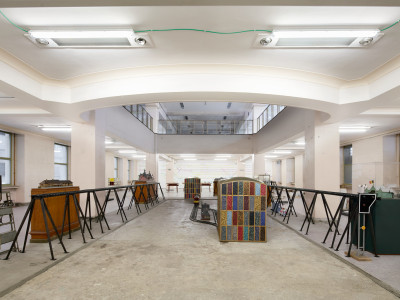
Marina Pinsky
— Circuit
- –
- Brussels North Station - Former railway museum
Circuit is an exhibition set in the old train museum inside Brussels-North railway station. Marina Pinsky proposes her own version of a museum in miniature in the form of a model-train installation connecting a complex of sculptures and scale models of buildings made by artists and architects. The artist has long been interested in model trains and the elaborate worlds that they recreate—the microcosmic and museological impulses at the heart of this practice. Running between the various contemporary and historical architectural models are elevated train tracks produced by the artist. These connect models of stations throughout Belgium which were previously housed on this site. Purposely integrating various styles and temporalities, of both realized and imagined architectural projects, _Circuit _aims to present many permutations of what a city can be.
Opening hours
Wednesday - Sunday
10:00-12:00; 12:30-17:00
Closed on:
11 11 21, 24 12 21, 25 12 21, 31 12 21 and 01 01 22
Marina Pinsky (b. 1986, Moscow) works in the medium of photography, and with photographic methods, which she extends into sculpture and installation. Her work mostly begins with historical cues, from which she picks up individual elements such as architectural forms and scientific representations. Marina Pinsky currently lives in Berlin and works in Brussels.

The art trail Endless Express_ _is spread over different destinations along the railway line between Ostend and Eupen. Taking the public sculpture Esprit ouvert by Tapta as a symbolic point of departure, seven artists were invited to present new works around the stations and tracks. With the train as a unifying element, they explore the networked histories embedded in this landscape and entangled with this line. With new works by Che Go Eun, Inas Halabi, Flaka Haliti, Chloé Malcotti, Sophie Nys, Marina Pinsky and Laure Prouvost.
The Ostend-Eupen railway line is the longest in Belgium, traversing its three official language regions in about three hours—from the royal seaside resort in the west to the industrial river valley in the east, with the capital of Brussels in the centre. The train—introduced shortly after Belgium was founded in 1830—speaks in a broader way of industrialisation, the promise of progress, and how these forces have transformed this country.
The artists included in this exhibition are all based in Belgium or its neighbouring countries. Some imagine the train as a mythical creature re-enchanting the world, others question the notion of thinking in a straight line, as well as labour and its rhythms, or playfully disrupt the clockwork time that helped shape the society of speed we live in today.
Curator: Caroline Dumalin
The health and safety of our visitors, artists and staff is paramount. EUROPALIA follows the regional COVID measures. We ask all our visitors and staff to respect the physical distance of 1.5 meters. Face coverings are optional and hand sanitiser is available along with increased cleaning regimes.



